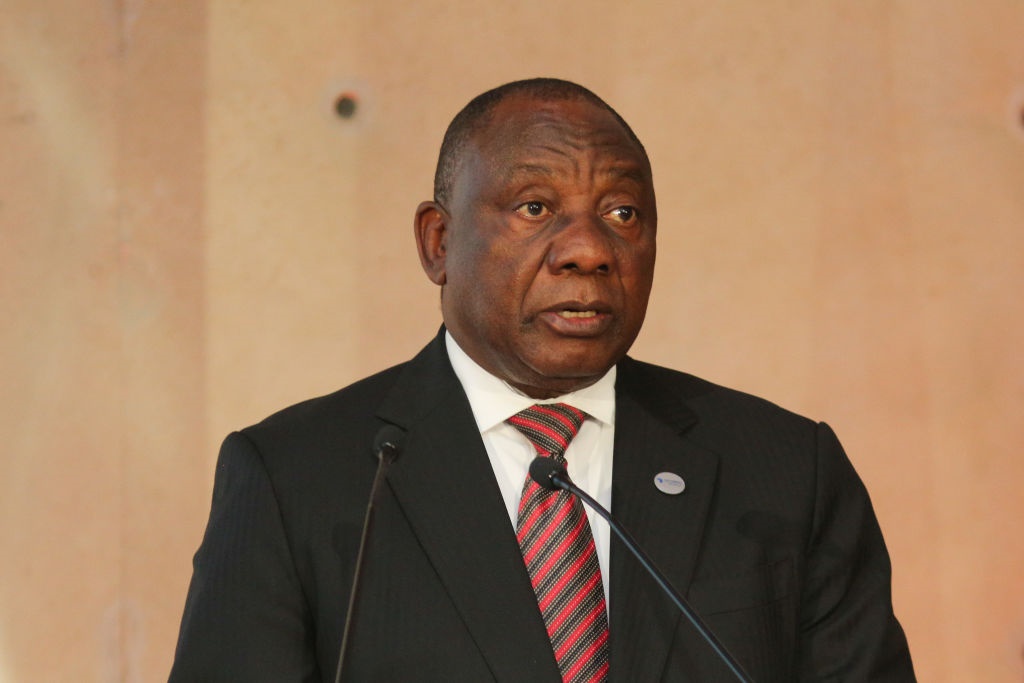
Having failed to diagnose the problem, Ace Magashule rhetorically subjected the economy to the kind of treatment expected of a doctor who had neither diagnosed the patient's ailment nor had the capacity to, writes Mpumelelo Mkhabela.
When President Cyril Ramaphosa concluded his State of the Nation Address in February with an inspirational quote, he received a round of applause.
Urging South Africans to roll up their sleeves, Ramaphosa cited the regularly quoted parts from a 1910 lecture by former US president Theodore Roosevelt.
"It is not the critic who counts; not the man who points out how the strong man stumbles, or where the doer of deeds could have done them better," he said.
"The credit belongs to the man who is actually in the arena, whose face is marred by dust and sweat and blood; who strives valiantly; who errs, and comes short again and again, because there is no effort without error and shortcoming; but who does actually strive to do the deeds…"
The man in the arena, Ramaphosa continued with his citation, is one "who at the best knows in the end the triumph of high achievement, and who at the worst, if he fails, at least fails while daring greatly, so that his place shall never be with those cold and timid souls who know neither victory nor defeat."
It's a nice quote from a great lecture entitled "Citizenship in a Democracy". Typical of products of great thinkers, they are often impossible to quote in selected parts.
The entire lecture was a solid philosophy for outstanding citizenship in a democracy. Roosevelt was speaking in Paris, at the Sorbonne, which he described as the most famous university of Medieval Europe.
It is the kind of lecture we should all read. It has a message for the lazy, the filthy rich, the workaholics, the corrupt, the courageous, leaders, the poor, the learned and so on.
But Ramaphosa didn't refer to another crucial part of the Roosevelt lecture that deals with the relationship between leaders and ordinary citizens in a democracy.
"The average citizen must be a good citizen if our republics are to succeed. The stream will not permanently rise higher than the main source; and the main source of national power and national greatness is found in the average citizenship of the nation," Roosevelt said.
"Therefore, it behooves us to do our best to see that the standard of the average citizen is kept high; and the average cannot be kept high unless the standard of the leaders is very much higher." [italics for my emphasis]
Which brings me to the political response to the two major crises we find ourselves in our republic: declining economic growth and an increasing unemployment rate. In the first quarter, the economy contracted by 3,2% and unemployment rose to 27,5%.
In a statement, ANC secretary general Ace Magashule described unemployment as a "national disaster". It was a correct expression of outrage. But one would have expected that the outrage was not for the sake of just talking.
It should have led to the next step: to establish the cause of the national disaster. A quick desktop study would point to low growth. The causes of low growth, once discovered, should then be followed by necessary measures to address them.
Magashule didn't need to conduct an in-depth investigation. Information about causes of low growth and what needs to be done about it is in the public domain. Economists, political analysts, the Reserve Bank, National Treasury, rating agencies and knowledgeable bureaucrats, trade unions, civil society groups, journalists and, more importantly, investors talk about the causes daily.
But having failed to diagnose the problem, Magashule, speaking on behalf of the ANC's NEC lekgotla, rhetorically subjected the economy to the kind of treatment expected of a doctor who had neither diagnosed the patient's ailment nor had the capacity to.
Magashule said the governing party would seek to implement "quantitative easing", a concept he has little or no understanding of. To underscore his lack of knowledge of the prescription, he misspelt it. He further incorrectly stated that it's a "practice" that developed countries "consistently" use to "save" their economies.
Quantitative easing is a monetary policy instrument that injects money into an economy. It can be applied by a central bank when an economy has a liquidity problem which even a drastic reduction in interest rate cannot solve. Those that have applied it, notably the US Federal Reserve, did so as part of a strategy to boost the economy to get out of a recession. They had exhausted other mechanisms including dropping interest rates to near-zero.
There is bound to be complication when you administer chemotherapy to a patient whose medical condition is malnutrition. Fortunately, we are only talking about a threat here. The sane among the leadership, including Reserve Bank Governor Lesetja Kganyago, have since provided reason amid madness.
South Africa is not in recession and does not have a liquidity problem. Our banks are highly liquid and economic transactions are taking place daily.
One of the things the US government did prior the implementation of quantitative easing was to bail out troubled banks to give them the necessary confidence to extend credit and re-oil the economy. New capital adequacy ratios – the amount of capital banks keep to withstand shocks – were imposed on US banks and indeed globally. South African banks never had capital adequacy issues.
Thabo Mbeki often points out that South African companies, including banks, have healthy balance sheets. Compared to others around the world, they keep a lot of capital. That some are hesitant to invest it is an issue of lack of confidence and a tinge of conservativeness. It is statements like those from Magashule that would make companies feel justified to be overly averse to risk.
Magashule refers to the settling of inter-governmental debt through quantitative easing. A quick check with Treasury of how much municipalities, provincial departments and national departments return to the national treasury due to failure to spend will indicate that even the government doesn't have a liquidity problem. It has a bad governance and leadership problem.
The government is highly indebted but has not reached the IMF definition of unmanageable debt. But even debt can't be solved by printing money, unless we want to lose our currency completely like Zimbabwe or take big bags of cash only to buy a loaf of bread with no guarantee it would be available. Someone needs to follow the news about Venezuela.
A few basics of economics must be understood by leaders whose average standard, according to Roosevelt, should be very much higher if they hope to ensure the standard of the average citizen is high.
In summary, Magashule and whoever he works with, represent the kind of problem Roosevelt sought to address when he said it was the duty of leaders to ensure the standard of the average citizen is high. And as Roosevelt pointed, the standard of the average citizen cannot be high unless the standard of the leaders is very much higher.
As an admirer of Roosevelt, Ramaphosa must regularly demonstrate to the nation that he and his governing party (inclusive of Magashule) are of a very much higher standard than the average citizen. Otherwise, our democratic republic is doomed.
- Mkhabela is a regular columnist for News24.
** Want to respond to the columnist? Send your letter or article to voices@news24.com with your name, profile picture, contact details and location. We encourage a diversity of voices and views in our readers' submissions and reserve the right not to publish any and all submissions received.
Disclaimer: News24 encourages freedom of speech and the expression of diverse views. The views of columnists published on News24 are therefore their own and do not necessarily represent the views of News24.




 Publications
Publications
 Partners
Partners






















